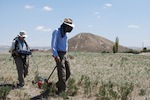


understand local change at
global scales.
GLOBE is now open to all members of the land change science community.
______________________________________________________________________________________
Recent News
ArchaeoGLOBE: The First Collaborative Global Assessment of Archaeological Knowledge on Land Use
When did human societies first transform Earth? On August 30, 2017, the GLOBE project received a supplement from NSF to collaborate with archaeologists in PAGES to find new ways to synthesize the local knowledge of archaeologists at global scale. Exactly two years later, on August 30, 2019, the ArchaeoGLOBE project based on this support published its results
Ambiguous Geographies: New paper shows why case study geography is so important
One major discovery of the GLOBE project is that published geographic descriptions of case study research sites are commonly vague and ambiguous, making it difficult to reuse these studies in global and regional synthesis research. Now, we demonstrate this in a new paper using analyses based on GLOBE’s case quality scores in the Annals of the American Association
GLOBE Newsletter #3
World Bank Projects and Globe Interface Upgrades Issue: September, 2015 Since our last newsletter, GLOBE has been fined tuned with improvements ranging from a redesigned interface to an updated similarity analysis. Now, the GLOBE team would like to share two new exciting updates. We have added thousands of World Bank Projects to our case library
More than 14,000 World Bank Project sites now available in GLOBE
Are World Bank Projects Globally Biased? GLOBE has partnered with AidData to make available their geocoded World Bank Project sites in GLOBE (IBRD-IDA, Level 1, Version 1.0 dataset). All project site locations are linked to an individual World Bank project. Complete documentation about AidData’s World Bank cases in GLOBE can be read here. More than 14,000 World Bank project sites are









